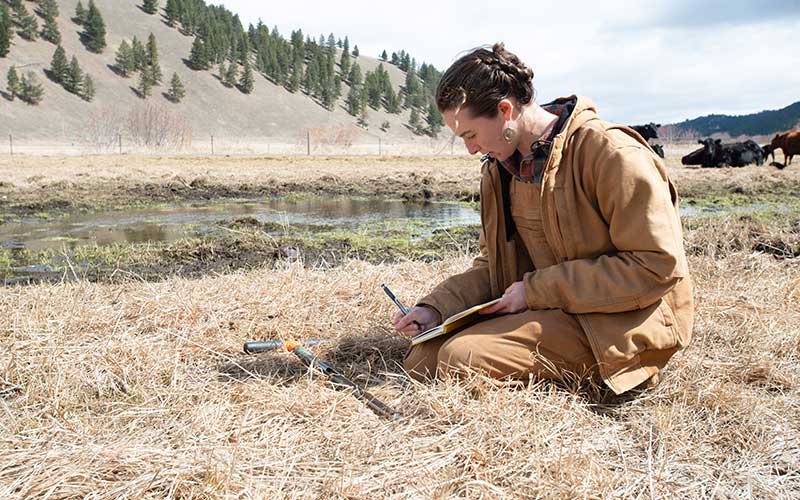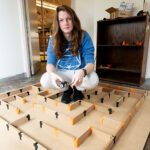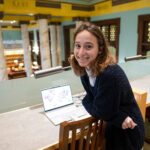
Scientific collaboration offers insights to farmers on soil health

Attracted to the idea of mentored research and “the opportunity to delve deeply into a topic and become an expert,” Claire Wineman ’21 came to The College of Wooster from her home in Denver, Colorado, originally intending to study social work, but after taking classes in Earth sciences, she realized a passion for soils that she wanted to explore. “What I really liked when I discovered soil science was that it felt like an area of science where lots of different fields came together,” said Wineman, who decided to major in environmental geoscience instead. “I was able to work with people in more of a social science context and then simultaneously be studying all of these hard science aspects that I was really interested in learning about.”
Studying the “hard science” while still keeping in mind the social science aspects of the research became the focus of her Independent Study—a research project that incorporated her experiences in an anthropology class studying Amish Peoples and Cultures at Wooster. She developed a qualitative study interviewing and working with farmers to analyze and make adjustments to their soil health back in her home state of Colorado when the pandemic forced her to complete her I.S. remotely.
What I really liked when I discovered soil science was that it felt like an area of science where lots of different fields came together.”
— Claire Wineman
Wineman learned scientific lab skills as a research assistant with Meagen Pollock, associate professor of Earth sciences, in her sophomore year while studying petrology and found her true passion lay in soil science. “All of human life depends on soil because it’s what we use to grow our food. I took an interest in learning about the actual hands-on, farming aspects,” Wineman said. Pollock worked with Wineman to develop a research project around her interests. “The best science is done when more varied and diverse perspectives are included in the conversation,” Pollock said. “In Claire’s case, her interests really extended and broadened my own.” Pollock reached out to David McConnell, professor of sociology and anthropology at Wooster, whose research interests include how the Amish engage with nature and the environment. Through a collaborative research grant, Wineman worked with McConnell and a student completing field research with Amish farmers, and later she adapted questions they asked the farmers for her own project.
“Claire’s research followed recommended practices for collaboration with the community,” said Pollock, noting the importance of scientific communication. “Think about the communication about the coronavirus pandemic and the importance of trusting relationships between scientists and the community. To me, we need to be teaching scientists to be aware of the context of what they’re studying, to understand how to develop those relationships with people, and to know how to effectively communicate key information from science that will help people make informed decisions.” Pollock added that Wooster’s liberal arts model allowed Wineman to collaborate with McConnell so effectively. “You can’t do this kind of project if you’ve never had an anthropology class or gone out in the field with an anthropologist and been through that interview process,” she said.
While Wineman planned to interview Amish farmers in the Wooster area and work with them to study and analyze their soil, everything changed when campus closed for summer 2020. She took initiative and found farmers near her home in Colorado. “She had to cultivate the community of farmers that she worked with as opposed to here where those relationships were established,” Pollock said. “Her enthusiasm, training, and preparation prior to the pandemic really went a long way to making this happen.”
Once she’d interviewed the farmers about their farming practices, soil health, and how they could collaborate, Wineman analyzed samples of their soil using portable x-ray fluorescence (pXRF) technology that she borrowed from the College. With a limited amount of lab research taking place on campus in the fall, Wineman was able to borrow the instrument throughout the semester. “It looks exactly like an x-ray gun right out of sci-fi,” joked Pollock. “It allows us to analyze the chemical makeup of the soil and its nutrients,” she added, explaining that Wineman trained with Wooster’s Earth sciences technician Nick Wiesenberg, to ensure proper safety protocols for working with the x-ray generating equipment. Wineman developed a new procedure for using this practical scientific technology to help farmers understand how to grow better crops. “The pXRF yields near-immediate, more cost-effective, and more accurate results than external lab soil tests, which tend to act as a barrier to farmers learning more about their soil health. Because the pXRF is a smaller piece of equipment that can be easily set up and used in agricultural fields, it provides an excellent opportunity for scientists to interact directly with farmers,” said Wineman, adding, “Learning from them about their practices and land use history placed my research results in context and allowed me to provide feedback for farmers about how to improve or change their soil health.”
We need to be teaching scientists to be aware of the context of what they’re studying, to understand how to develop those relationships with people, and to know how to effectively communicate key information from science that will help people make informed decisions.”
—Meagen Pollock, associate professor of Earth sciences
Completing her field work in this “open space where farmers could speak honestly about their perspectives on science” was important to Wineman based on an idea she picked up in her work with McConnell in Wooster that she referred to as “the art of cultural relativism.” She explained, “Dr. McConnell prepared me to analyze people’s perspectives from a place of deep respect in order to gain understanding and empathy for those perspectives.” Turning in her I.S. in early January for I.S. button No. 2, Wineman enjoyed sharing the results of her study with the farmers she interviewed early in the spring semester. “Quite a few of the people I worked with are just starting out and purchasing their land or haven’t started cultivating it yet. It’s exciting to be one of the first soil scientists to be giving them an idea of their soil health and helping them put together plans to decide how to build up that soil health and what they’re going to raise. I’m super grateful to be part of that process.”
 Seeing Wineman pull together “two such different disciplines and really meld them together in one coherent I.S.” as well as being able to really share her results and the impact of her research with the farmers has also been really rewarding for Pollock. “A lot of people think of science as an isolated thing that you do in the lab if you’re a chemist or in the field for geologists, and yet there are real-world applications,” she said. “The model that Claire implemented of true scientific collaboration with a community was something that her work showcased. It’s exciting to see immediately how your work is making a difference. That’s what excites me about teaching, mentoring, and advising.”
Seeing Wineman pull together “two such different disciplines and really meld them together in one coherent I.S.” as well as being able to really share her results and the impact of her research with the farmers has also been really rewarding for Pollock. “A lot of people think of science as an isolated thing that you do in the lab if you’re a chemist or in the field for geologists, and yet there are real-world applications,” she said. “The model that Claire implemented of true scientific collaboration with a community was something that her work showcased. It’s exciting to see immediately how your work is making a difference. That’s what excites me about teaching, mentoring, and advising.”
Completing her I.S. as well as all the credits she needed for her senior year at Wooster early allowed Wineman the opportunity to apply for and begin an apprenticeship at Cooper Creek Ranch in Helmville, Montana, through the Quivira Coalition, an organization that fosters ecological, economic, and social health through education, innovation, and collaboration in regenerative agriculture. Her day-to-day activities include everything from caring for newborn pigs, raising cattle, and supporting the running and marketing of the business as well as continuing her studies of soil health. “I’m putting the lessons of my I.S. to good use as I continue to develop my soil science knowledge in the context of my mentor’s practices, land, and animals,” she said. This spring she helped to design and implement a hydrology plan that addresses the ranch’s water supply needs and is studying how soil health influences animal feed, and her work will continue into the fall. She’s also interested in expanding her education through a graduate program in agroecology. “My true passion lies with growing food, raising food, and finding a way to connect with people through that,” Wineman said. “I’m constantly in pursuit of intertwining the roles of scientist and farmer with each other.”
Originally published in the summer 2021 issue of Wooster magazine.
Posted in Independent Study on June 8, 2021.
Related Posts
Related Areas of Study
Environmental Communication & Action
Explore ways to effect change in environmental policies through communication and activism
PathwayEnvironmental Studies
Natural sciences, social sciences, and humanities courses combine for those who want to be part of environmental solutions
Major MinorEarth Sciences
Geology, environmental geoscience, geophysics, and other classes that explore Earth and the impact of humans
MinorEnvironmental Geoscience
Investigate the impact humans have on the Earth and research ways to solve pressing environmental problems.
Major Minor

